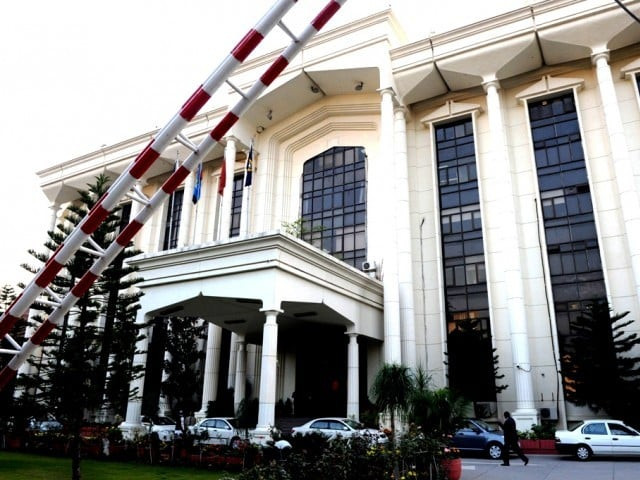FBR gets 6th chairman in 32 months
Government appoints Asim Ahmed as chief of Federal Board of Revenue

The government on Friday appointed Asim Ahmed as Chairman of the Federal Board of Revenue (FBR) - the sixth head of the revenue board in around two and a half years - who will face a new challenge of exerting his office authority besides increasing tax collection by 27% in the next fiscal year.
Ahmed will replace Javed Ghani, who attained the age of superannuation today (Friday) after remaining the FBR chairman for 100 days.
The government secured approval of the federal cabinet to appoint Ahmed as the FBR chairman by circulating a summary among the ministers. Ahmed - a grade-21 officer of the Inland Revenue Service (IRS) - was serving as the member information technology.
“Upon recommendation of the minister for finance and revenue (Hammad Azhar), the prime minister has desired that a summary, containing a panel, shall be placed before the federal cabinet with the recommendation that Ahmed may be considered for appointment as chairman FBR,” according to a summary of the Establishment Division.
The government had handpicked a panel of three candidates, Asim Ahmed, Dr Tariq Huda - a Customs group officer, and Syed Nadeem Rizvi of IRS.
All three officers are currently in grade 21 and the post of FBR chairman is of grade 22.
There is a possibility that Ahmed may be promoted in a high-powered board meeting next week. He is at No 15 on the seniority list in the IRS.
But a majority of officers, who are senior than Ahmed, are either not serving in the FBR or being considered not capable of being appointed as the FBR chairman, including those who are already in grade 22.
Ahmed is the sixth FBR chairperson in the past over two and a half years, raising questions over the government’s handling of the tax collection department, which is critical to the country’s economic security.
The outgoing chairman had unofficially relegated many of his functions to stronger members of the FBR.
Sources said that the first key challenge for Ahmed would be to restore the strength of the FBR chairman office by becoming a strong head. Ahmed’s name had been proposed by Special Assistant to Prime Minister on Revenue Dr Waqar Masood Khan, said the sources.
Before his appointment, Ahmed also met with Finance Minister Hammad Azhar. Another administrative challenge for the new FBR chairman will be to appoint people with integrity on key positions. In recent days, the FBR has made or attempted to make some appointments that raised serious integrity issues.
The FBR posted Mohammad Iqbal as Director General of Intelligence and Investigation wing but reversed his posting orders within three days, sources said. Iqbal enjoys a clean reputation and has played a key role in signing international tax-related treaties.
However, in the past almost three years, the FBR failed to utilise the information received from the Organisation for Economic Cooperation and Development and recoveries, which could be in billions of dollars, are just peanuts.
On the operational front, the key challenge for the new chairman will be to finalise a balanced taxation budget where taxes are levied on the basis of people’s ability to pay and also to achieve next fiscal year’s likely tax collection target of nearly Rs6 trillion.
But Ahmed’s hands will be largely tied due to an understanding between Pakistan and the IMF on broader contours of next year’s budget.
An IMF staff-level report suggests FBR’s tax collection target at Rs5.963 trillion - higher by Rs1.3 trillion or 27% over the current year’s downward revised tax collection target.
The report showed that the Pakistan Tehreek-e-Insaf (PTI) government would not be able to achieve its tax collection target for the third year too and the collection this year is projected at less than Rs4.7 trillion. In first nine months, 45% of the total collection of Rs3.4 trillion was made at the import stage.
The FBR collected a mere 4.3% of the total income tax collection with its own efforts and the remaining collection was on account of advance taxes and withholding taxes.
As per understanding with the IMF, the government would change both general sales tax (GST) and personal income tax rates with the fiscal year 2021-22 budget, yielding an estimated 1.1% of GDP or Rs570 billion, excluding revenue impact of the custom and federal excised duties measures.
The government “will eliminate all zero-rated goods, currently protected under fifth schedule, except on export and capital machinery goods and move them to the standard sales tax rate.
It will remove reduced rates under the Eight Schedule and bring all those goods to the standard sales tax rate”.
Similarly, it will “eliminate exemptions (Sixth Schedule) excluding a small subset of goods (ie, basic food, medicines, live animals for human consumption, education and healthrelated goods) and bring all others to the standard rate” of 17%.
The report showed that the government will also “remove the Ninth Schedule to replace a specific tax rate for cell phones with the standard rate” of 17%. There will also be significant changes in the income tax rates by reducing the number of tax slabs, confirms the report.



















COMMENTS
Comments are moderated and generally will be posted if they are on-topic and not abusive.
For more information, please see our Comments FAQ